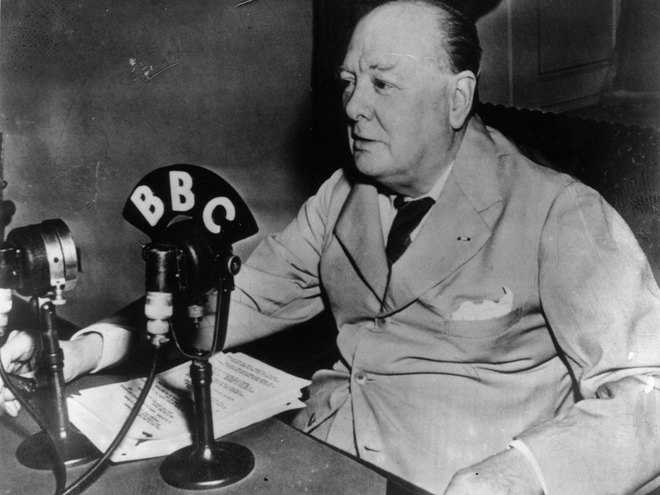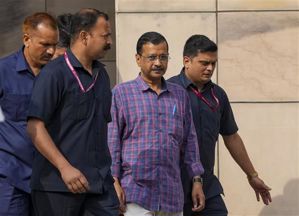
Congenial evil: The book stresses Winston Churchill's racist world view, and makes a frank case against him as being responsible for the catastrophic Bengal famine of 1943
Shelley Walia
Winston Churchill is widely regarded as a stalwart of political acumen who squelched the sweeping tide of fascism with his indomitable will and brilliant military strategy resulting in a decisive Allied victory in the Second World War. However, many still remain unmindful of his role in imperiling the colonised to a systemic persecution of inhuman racism, an alarming aberration of human history that has essentially been unreported in the western press. His misgovernment of the Raj is indeed a blotch on his wartime stature. Like the noteworthy discourse against Columbus and his liquidation of the natives, the narrative on Churchill’s prominence, too, is marred by his cold-blooded ideology that considered the colonised subjects “a beastly people with a beastly religion.”
History bears witness to the catastrophic Bengal famine of 1943 which drew little humanitarian response from Churchill or the British High Command. The appalling notion of “Indians breeding like rats” who must be left to die of hunger does not figure in the Western annals of history that remain hushed on his war crimes, eclipsed as they are by Churchill memorabilia of jokes and idiosyncrasies.
This, in Orwellian terms, is depraved politics breeding debased and affected language misused for reasons of wit and humour that coarsens the very essence of political thought. Indeed, the book by Madusree Mukerjee is a succinct and comprehensive history of British imperialism gone brutal, a déjà vu of the extermination visible in Nazism and Auschwitz. On the one hand, Churchill is touted by the free world as the leader and promotor of democracy but on the other hand, and far more damaging to the same forces of freedom, a man, who did not waver in violently oppressing the colonised masses in India. A provocative question for debate is raised by the author: Who is guiltier of triggering an earth shattering human tragedy, Churchill or Hitler?
It is the quintessential experience of a nightmare of history with its blurry lines between truth and fiction, that mark the last years of British rule in India. Behind the act of writing such a history is the inspiration that Mukerjee derived from the personal account of the famine in “awful detail” by Mahasweta Devi, compelling the regrounding of historical perceptions and reassessing the conflicting sympathies and antipathies of history. The book is the writer’s struggle with the established British historians and the complicity of their versions with the imperial ideology.
A time had come when no longer would the people of India remain submissive or mute in the face of injustice and onslaught on Indian culture and human life. The resentment resulted in a unrelenting, united front that kept the heat on the invaders till they had no choice but renounce their hegemony. The book stresses Churchill’s racist world view, and makes a frank case against the credibility of the Empire or its portentous Prime Minister who were responsible for the famine that became a catalyst for resuscitating the masses to rise up against the interlopers. Though an invective against Churchill, Mukerjee’s history represents the far-reaching struggle against a ruthless system. It is good that the book has been reprinted and released by the Penguin.
Histories about imperialism indeed have the distinctive habit of growing darker as new facts and research come to light. Can it be surmised that the famine was the price Indians had to pay for their freedom? Or conversely, the argument that the dying millions could have been saved by a few shiploads of food thus postponing the provocation against the British and thereby their departure? Whatever the reason, Churchill remained opposed to the idea of bestowing on the Indian people the right of self-government fearing it would “leave them to anarchy or subjugation”.
The British were, indeed, guilty of exporting food grains from India and promoting the cultivation of indigo and jute. The food crises were further exacerbated by the Japanese taking over Burma and cutting of the import of rice into India. With the panic that the Japanese might enter India, the British and their native minions began to impound food grains inducing scarcity at a colossal level. The disaster could have been averted by sending in supplies and thereby bringing the prices to some affordability. But instead of heeding the global outcry for aid, Churchill diverted his food carrying ships to Italy and the shores of Britain to shamelessly enhance the reserves.
Apart from the genocide of the famine, the collateral damage suffered by the Indians and the Muslims owing to the divide-and-rule British policy further added to the suffering and rape of millions left displaced. Churchill kept most of the Indian leadership incarcerated during the war years. Harsh punishment was meted out for minor crimes. The British bureaucracy, the conditions of hunger and oppression lead to the intensifying of resistance that would finally close the colonial chapter in Indian history. The British were vanquished in the end but not before the largest manmade, completely avoidable tragedy in world history with more than four million Indians starved to excruciating death. Mukerjee puts the highly venerated Prime Minister with all his political statesmanship under a scanner demolishing his age-old legacy to expose his willful responsibility in initiating the terrible holocaust in the Indian sub-continent that lay buried in the rank darkness of oblivion for years.


























